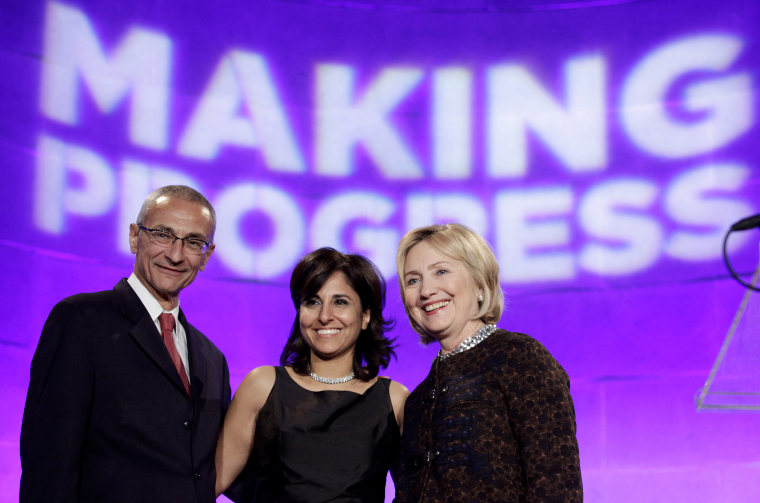Neera Tanden distinctly remembers a meeting she led more than a decade ago while serving as policy director on Hillary Clinton’s first presidential campaign.
Tanden, the most senior-level staffer in the room, said she wasn’t necessarily treated as such. It was particularly apparent in comparison to the treatment of her deputy, a white man, who was roughly a decade younger, “very accomplished,” yet still her junior.
“When I spoke, everyone looked at my deputy for assurance of what I was saying. Someone actually checked in with him verbally and said, ‘Does that makes sense to you?’” Tanden, President Joe Biden’s pick to lead the Office of Management and Budget, told NBC Asian America. “It was really frustrating. You know it's just because it was not their perception that an Asian woman would be the leader of this meeting.”

Tanden, who’s been described as Biden’s most polarizing nomination, could make history as the first woman of color to lead the agency. But the nominee, whose second day of confirmation hearings kicked off Wednesday in front of the Senate Budget Committee, said she has not overlooked the fact that the rareness of an Asian American woman in a male-dominated field makes her vulnerable to skewed judgments and preconceived notions, along with being a trailblazer.
There’s work to be done, she said.
“There are a lot of places where there are so few voices,” the 50-year-old said over the phone in December. “But I also think that there's a reinforcing idea, and the more we see Asian women in roles dealing with hard public policy issues, numbers, we can break stereotypes in a way that allows more women, more Asian women, more Asians to really see themselves in the country fully.”
In a number of instances throughout her career, Tanden has endured backlash across the aisle, much of which has been reignited alongside her nomination. Tanden, who’s awaiting the vote that would decide her confirmation, faced Sen. Bernie Sanders, I-Vt., who helms the budget committee. The nominee was vocal about her opposition to Sanders, who faced off against her former boss Clinton, during the 2016 election and wasn’t shy about slamming his leftist supporters who criticized her for her more centrist views.
Sanders confronted her over what he calls “vicious” attacks during the hearing, for which Tanden has apologized. Meanwhile, Sen. John Kennedy, R-La., accused her of calling Sanders “everything but an 'ignorant slut.'" The nominee responded, indicating that she regretted her past comments.
During her first hearing in front of the Senate Committee on Homeland Security and Governmental Affairs on Tuesday, Tanden had to answer to some of her past tweets aimed at GOP legislators. The nominee, who apologized for her past online conduct during the hearing, was criticized for the “tone, the content and the aggressive partisanship” of her comments by Sen. Rob Portman, R- Ohio.
Such criticism is familiar to the nominee, she says. Tanden says she has frequently been described as “aggressive,” a term that she said she feels assigned to her because of the current racial environment. The collision of racial and gender stereotypes have, in part, likely skewed the image some have of her conduct in professional environments, she said.
“I think there are perceptions or stereotypes of Asian women as less strong or more meek. And perhaps seeing me, people have perceptions that I'm more aggressive than a man would be in this role,” she said.
Asian Americans, while most likely to be hired in technical roles, were found to be least likely to be promoted, according to research examining Silicon Valley. Asian women face the added stereotypes as being quiet, subservient and compliant. And thus, the data revealed Asian women are the least represented as executives, relative to their percentage in the workforce.
“People's perceptions of leadership and who leaders are has not been, to this moment, an Asian American woman. And that means that I have to do more work than maybe others have had to communicate my leadership and what I bring to the table,” Tanden explained.
She noted that, given the way she sees many men conduct themselves in professional environments, she says she can hardly deem herself as aggressive.
“I think there are perceptions or stereotypes of Asian women as less strong or more meek. And perhaps seeing me, people have perceptions that I'm more aggressive than a man would be in this role,” she said. “I leave that to others, I would just say that, in my experience, I've worked for and been around a lot of male leaders who seem a lot more assertive than me.”
It’s almost impossible to escape criticism as a woman of color in a leadership role, she said. People of color have long described the code-switching and conforming they must do to be seen as palatable in many predominantly-white environments. Straying outside such bounds, many fear, could mean appearing less capable or professional. For Tanden, the rules feel narrow, she explained.
“When you're doing what male leaders do, you're perceived as aggressive. But if you don't, you're not being a ‘leader,’ then you're painted as not having leadership skills,” she said.

Tanden has held her share of leadership positions on both campaigns and as president of the Center for American Progress. In her professional life, she said she’s taken cues from observing the experiences of her immigrant mother, Maya Tanden, who raised two children on her own in a new country. The family, who settled in a small town in Massachusetts, stuck out both because of their color and class, Tanden said. She recalled being one of the only families at the store, buying their groceries with food stamps.
“I remember one time being in line, and it's taking a little longer, and people were getting frustrated behind us. And I was like, ‘Why are we using this money when everyone else is using normal looking cash?’ and my mom said to me, ‘We need to do this.’ I remember thinking really vividly that we were very different on multiple levels, because we were the only South Asians, were the only brown people in that grocery store, often where we were and, also we had this experience,” she said.
She added: “So many immigrant families have struggled and have, you know, had to face similar struggles.”
“South Asian mothers, there’s a lot of strength in the community but their roles in the past have been somewhat prescribed. So I really heard my mom pushing me to do things that she couldn't do, but maybe would have wanted to, if circumstances were different. And so that's deeply meaningful to me,” Tanden said.
While financial stability remains a hot topic in her family because of what they experienced in those early years, she said the concern didn’t stop her mother from simultaneously pushing her to take risks, heavily influenced by the lack of opportunities she was afforded in her own life. When she ran for external vice president of her college, UCLA, her mother delivered a pep talk that she says she often reminds herself of to this day.
Tanden said she still remembers looking out the window of her apartment at the time, reflecting on that statement in the context of her South Asian mother’s own life.
“South Asian mothers, there’s a lot of strength in the community but their roles in the past have been somewhat prescribed. So I really heard my mom pushing me to do things that she couldn't do, but maybe would have wanted to, if circumstances were different. And so that's deeply meaningful to me,” she said.
As discussions around Tanden and her tweets continue, the nominee said that her statements came during a time of “hyperpartisanship” and she hopes that people will take the time to get to know her beyond what was written on the social media platform so “they can just see the full flesh of who I am, not just one particular picture from a few scraps of words.
“I'm a product of experiences I've had as a daughter of immigrants. This country really did, at a time, have a series of policies that made it possible for me to be who I am,” she said. “I've known from a young age, really, that I am only here, because people in our government decided to create programs that gave us a chance.”
